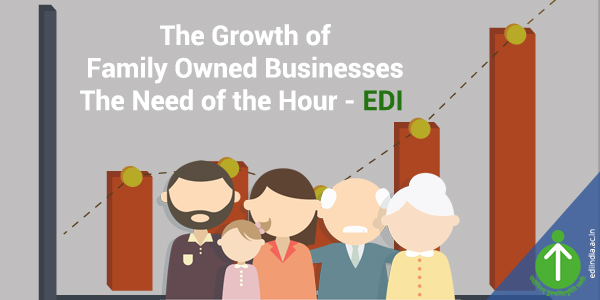The Growth of Family Owned Businesses – The Need of the Hour – EDI
The best way that one can give back to their country is by starting businesses that would add to the country’s growing economy. Although having a family-owned business comes with all the same responsibilities and concerns that public companies have to deal with, the former case is seen as more desirable as you and your family are likely to have greater monopoly over the entire situation.
Family-Owned Businesses in India
Most family-owned businesses have their roots in the joint family system. In India, every family-owned business is always striving to improve their growth and bring about a certain amount of professionalism to the job. However, by keeping with the changes in technology and developing trends, family-owned businesses have witnessed a growth in the past year and are foreseeing a 50% increase in bullish growth.
A majority of families follow a line of succession that is based on age so while two-thirds of family businesses already have plans of succession in place, only 15% of them will actually help improve the business play. This is because apart from not being documented, the rest are not robust at all. The only good part is that a very large majority of family businesses in India, about 75 percent, have a well-established mechanism in place to deal with all kinds of conflict.
The Impact on the Economy
About 90% of Indian businesses are said to be family-owned. It has been found that the contribution of family owned businesses to the domestic economy has been far more than that of the public sector or even of multi-national companies. About 50% of the businesses that are listed on the National Stock Exchange indexes are family-owned.
Hence, the progress of the Indian economy is closely intertwined with that of family-owned businesses. With a little aid and assistance in improving their strategies, family-businesses will soon become major contributors of the country’s Gross Domestic Product.
Challenges Faced by Family-Owned Businesses
Family-owned businesses do face a few challenges when it comes to their growth structure. The most important is the stiff competition that arises when you decide to take your business to an international level. Apart from this, succession plans may also cause a significant amount of damage to your increasing growth structure as the new generation may not have the knack of tackling the various business-related issues.
So unless you start to professionalize your management strategy, diversify your leadership strategies so that your business can witness better growth, you will not be able to reach very far.
How Can EDI Help?
At EDI, we have a well-structured syllabus that deals with all aspects pertaining to entrepreneurship education and development. We provide opportunities for you to engage in collaborative research with well-known personalities that have made a name for themselves in their own spheres.
By brushing you through the various strategies for rural and urban entrepreneurship, you will certainly have an advantage when you choose to start a family-owned business. With an academic fraternity that will train you in the different trends that affect businesses, you will be exposed to the various limitations that you are likely to encounter while embarking on this venture and will also learn how best you can deal with them.
So join EDI and let us open up the world of business to you so that you emerge a success.
Reference URLs:
http://www.pwc.com/gx/en/services/family-business/strategy-growth.html
http://www.pwc.com/gx/en/services/family-business/family-business-survey/territory-insights.html
https://leeiwan.wordpress.com/2006/08/17/20-challenges-faced-by-a-family-owned-business/
http://www.livemint.com/Companies/noJbF1pcZlPDmlRyO4AhqI/Economy-highly-dependent-on-familyrun-businesses-destiny.html
http://www.fmblinks.org/article/family-managed-businesses-in-india-the-opportunities-and-the-challenges
http://quod.lib.umich.edu/m/mfr/4919087.0002.208/–family-businesses-as-economic-phenomenon?rgn=main;view=fulltexthttp://www.ediindia.org/

